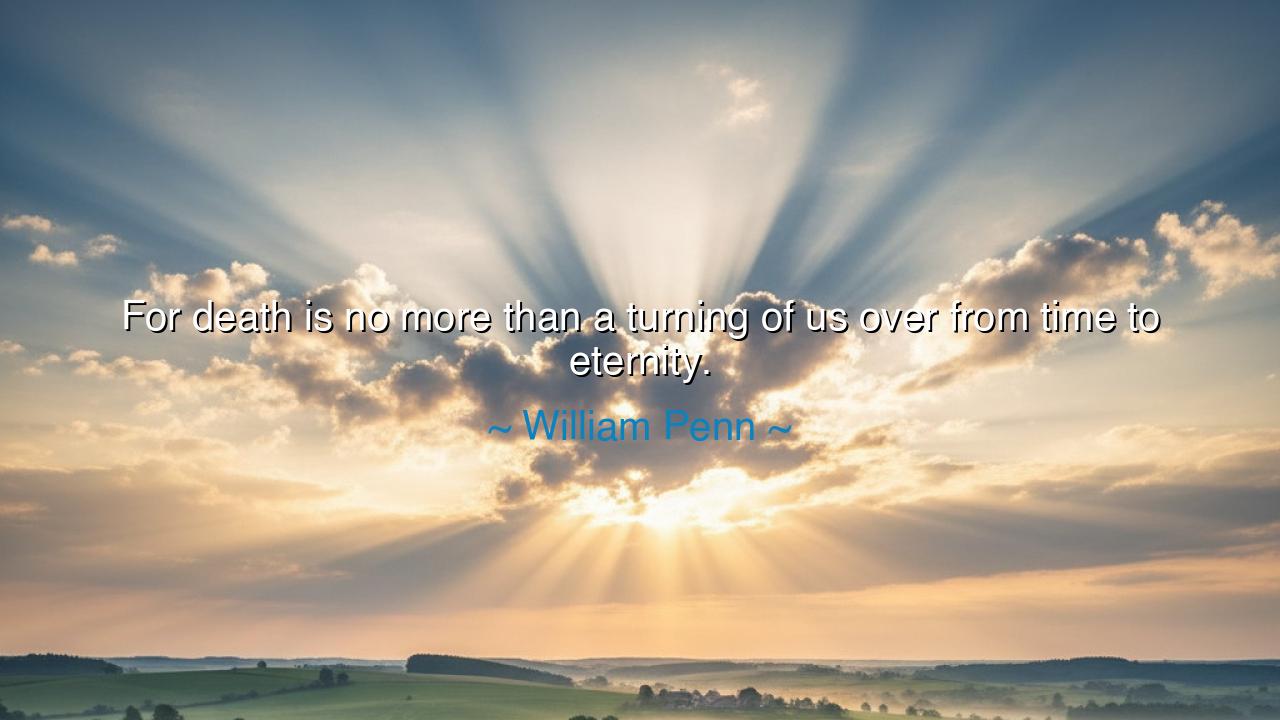
For death is no more than a turning of us over from time to






Hear now, O seeker of light, the immortal words of William Penn, a man of peace and vision, who said: “For death is no more than a turning of us over from time to eternity.” In this saying lies the quiet majesty of faith and the eternal rhythm of existence. Penn, a founder, a philosopher, and a Quaker sage, saw beyond the veil of mortal fear. To him, death was not destruction, but transition — not an end, but a passing, as gentle and inevitable as the turning of the seasons. He spoke as one who understood that the soul, being divine, cannot perish; it merely leaves the boundaries of time and enters the boundless shore of eternity.
William Penn lived in an age of great uncertainty — wars, persecution, and the ceaseless shadow of mortality. Yet his heart was steadfast, rooted in his faith that life and death were but two chambers of the same eternal house. The Quaker tradition to which he belonged believed in the inner light — the divine spark within each person — a light that no darkness could extinguish. Thus, when Penn spoke of death as a turning, he described it not as a fall into nothingness, but as a return to that original radiance from which all life springs. To him, eternity was not far away; it was simply the hidden half of reality, waiting just beyond the horizon of sight.
Think of the caterpillar, which crawls upon the earth, bound to the dust and the green leaf. One day, it withdraws into stillness, its body enclosed in silence. The world may think it dead — yet from that seeming tomb emerges a creature transformed, winged and free. So too, Penn tells us, is the soul at death: it does not cease, but changes its form, leaving behind the limitations of flesh to enter the wider sky of eternity. Time is the cocoon; eternity, the flight beyond it.
Consider also the story of Marcus Aurelius, the Roman emperor and philosopher, who wrote in his Meditations: “Do not act as if you were going to live ten thousand years. Death hangs over you. While you live, while it is in your power, be good.” Though he was not of Penn’s faith, he shared Penn’s understanding — that to live well is to prepare for eternity, and to greet death not with terror, but with readiness. Both men, across time and creed, saw life as a journey through time toward the timeless. Death, in their eyes, was not defeat but completion — the soul’s homecoming to what is eternal and true.
Yet there is in Penn’s words a gentleness unlike the stoic resignation of the ancients. His vision of death is filled not with cold philosophy, but with compassion and trust. “A turning of us over,” he says — as if a loving hand, unseen yet near, simply lifts us from one side of existence to the other. There is no violence in his description, no fear, no loss — only the natural movement from one realm to the next. This is the wisdom of faith: that death, which men dread, is but the continuation of divine purpose in a higher key.
What, then, shall we learn from this truth? We must cease to treat death as an enemy and begin to see it as a teacher. Let it remind us that our days within time are precious — not because they are all we have, but because they prepare us for eternity. Live, then, not in haste or despair, but in awareness. Speak words that endure beyond your breath. Love others as though you were already standing at the threshold of forever. For every act of kindness, every truth spoken, every forgiveness given — these are the currencies of eternity, the treasures we carry with us when time turns us over.
And when your own hour comes — as it must come for all — do not tremble, but remember Penn’s wisdom. See the moment not as a fall into darkness, but as a rising into light. For death is not the extinguishing of the flame; it is the lifting of the veil. Time will pass from your grasp, but eternity will receive you. And in that infinite dawn, you will find that nothing you ever loved, nothing good or true, has been lost — it has only been transformed, waiting for you on the far side of the turning.






AAdministratorAdministrator
Welcome, honored guests. Please leave a comment, we will respond soon